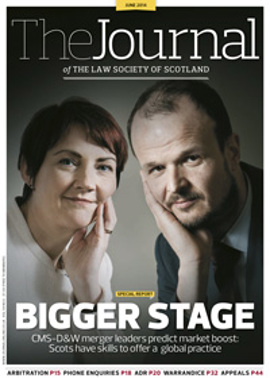ADR: Faculty makes its pitch
Some of the country’s top litigators are also offering their services as experts in resolving disputes by alternative means. The Faculty of Advocates Dispute Resolution Service (FDRS) has been set up to act as a single reference point for identifying members of the bar with special expertise in the field.
Gordon Reid QC, chair of the three-strong board that oversees the service, explains what inspired the move: “With the increase in interest in ADR procedures over recent years, it was felt that Faculty has something additional to offer over and above what advocates do traditionally, in appearing in court and giving advice. We felt that as advocates, we had been underselling ourselves in this area.” FDRS itself is a simple enough concept. Primarily, it is an online register of those members (one retired judge, 11 QCs and 13 juniors, at the time of writing) who have a particular interest in one or more of four types of ADR: arbitration, mediation, adjudication and expert determination.
Membership is on the approval of the Dean of Faculty, on the recommendation of the board, which looks at the qualifications and experience of each applicant – a process which has to be repeated each year, to ensure that high standards are maintained.
There are no registration charges or administration fees to access the service, and no institutional rules – the link for each FDRS member takes you to their stable and relevant contact there.
Fees, rendered through Faculty Services Ltd, are down to the individual, as is normal with arbitrators; Reid adds that rooms in the Faculty’s Mackenzie Building are generally made available free of charge, “consistent with the public spirit with which Faculty is imbued”.
The FDRS website (fdrs.advocates.org.uk) displays a code of conduct for arbitrators and one for mediators; there are as yet no model terms of engagement, though this is “a possible future development”, and some members, Reid included, offer their own.
FDRS has adopted the motto “Helping unlock disputes”, and the advocate’s training, Reid maintains, “is particularly suited to informal decision making”.
Mastery of procedure and of complex facts, the ability to think and write clearly, should be “second nature” to his profession, but are matters on which, he suggests, decisions of non-lawyer decision makers may be more open to challenge.
The annual re-application process for members wishing to have an FDRS listing has recently been completed.
In this issue
- “It is a wise father...”
- Let the Games begin
- Power for change: EHRC's litigation strategy
- Framework for tribunal reform
- MIAMs: making meetings the end?
- Legal locksmiths: locking and unlocking charitable gifts and bequests
- Reading for pleasure
- Opinion: Marjory Blair and Kirsty Miguda
- Profile
- Book reviews
- President's column
- The big day unveiled
- Identity crisis?
- Arbitration: the way forward in disputes?
- A brand new framework
- Hello? Hello?
- A mediation story: The Mediator's Log
- ADR: Faculty makes its pitch
- Justifying extensions
- Season of change
- Beneficial changes
- Stormy waters
- Which way will it jump?
- People on the move
- Games-time goals
- Acceptance or warrandice?
- Getting ready for the "designated day"
- Turning concern into action
- Ask Ash
- Here comes 2012
- Ploughing a lone furrow
- Safety in networking
- Law: an insight job
- Sheriff decision causes power of attorney alert
- Law reform roundup
- "Find a registered paralegal"






